| Listing 1 - 10 of 10 |
Sort by
|
Book
ISBN: 2738477283 Year: 1999 Publisher: Paris : L'Harmattan,
Abstract | Keywords | Export | Availability | Bookmark
 Loading...
Loading...Choose an application
- Reference Manager
- EndNote
- RefWorks (Direct export to RefWorks)
Appropriation (Art). --- Arts and society. --- Arts --- Impostors and imposture in literature. --- Forgeries.
Book
ISBN: 9791037010551 Year: 2016 Publisher: Paris (6, rue de la Sorbonne 75005) : Hermann,
Abstract | Keywords | Export | Availability | Bookmark
 Loading...
Loading...Choose an application
- Reference Manager
- EndNote
- RefWorks (Direct export to RefWorks)
De Renart à Diderot, la littérature n'est pas en mal d'imposteurs célèbres. Ce volume présente une série d'études sur le thème de l'imposture dans la prose narrative du Moyen Âge aux Lumières, dans une double perspective. D'une part, les études portent sur l'imposture dans la fiction en analysant les ruses et procédés des imposteurs selon une perspective topique ; d'autre part, c'est aussi l'imposture de la fiction qui est étudiée pour autant que le roman s'affuble volontiers du masque de l'illusion vraisemblable pour créer une réalité trompeuse. Quand y a-t-il imposture et comment peut-on la reconnaître ? Les lecteurs inquiets pourront ici trouver une série de clés de lecture qui leur éviteront de tomber dans bien des pièges de la fiction.
French fiction --- Impostors and imposture in literature --- Deception in literature --- Fiction --- History and criticism --- History and criticism
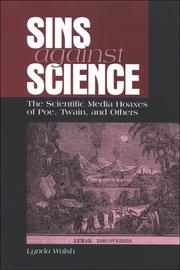
ISBN: 9780791468784 Year: 2006 Publisher: Albany (N.Y.) : State university of New York press,
Abstract | Keywords | Export | Availability | Bookmark
 Loading...
Loading...Choose an application
- Reference Manager
- EndNote
- RefWorks (Direct export to RefWorks)
"Lynda Walsh explores a provocative era in American history - the proliferation of fake news stories about scientific and technological discoveries from 1830 to 1880. These hoaxes, which fooled thousands of readers, offer a first-hand look at an intriguing guerilla tactic in the historical struggle between arts and sciences in America. Focusing on the hoaxes of Richard Adams Locke, Edgar Allan Poe, Mark Twain, and Dan De Quille, the author combines rhetorical hermeneutics, linguistic pragmatics, and reader-response theory to answer three primary questions: How did the hoaxes work? What were the hoaxers trying to accomplish? And - what is a hoax?"--Jacket.
Falschmeldung. --- Forschungsergebnis. --- Impostors and imposture in literature. --- Impostors and imposture in literature. --- Impostors and imposture in literature. --- Literatur. --- Naturwissenschaften. --- Science news. --- Science news. --- Science news. --- Scientific literature. --- Scientific literature. --- Scientific literature. --- Technik. --- Wissenschaftliche Literatur. --- imposture --- imposture --- Littérature américaine (Etats-Unis) --- Science --- 1880 --- Science --- 1880 --- De Quille, Dan, --- De Quille, Dan. --- Poe, Edgar Allan, --- Poe, Edgar Allan. --- Twain, Mark, --- Twain, Mark. --- Umschulungswerkstätten für Siedler und Auswanderer --- Geschichte 1830-1880. --- USA.
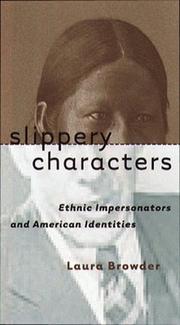
ISBN: 0807860603 9780807860601 0807825468 9780807825464 080784859X 9780807848593 9798890870827 Year: 2000 Publisher: Chapel Hill : University of North Carolina Press,
Abstract | Keywords | Export | Availability | Bookmark
 Loading...
Loading...Choose an application
- Reference Manager
- EndNote
- RefWorks (Direct export to RefWorks)
In the 1920's, black janitor Sylvester Long reinvented himself as Chief Buffalo Child Long Lance, and Elizabeth Stern, the native-born daughter of a German Lutheran and a Welsh Baptist, authored the immigrant's narrative I Am a Woman--and a Jew; in the 1990's, Asa Carter, George Wallace's former speechwriter, produced the fake Cherokee autobiography, The Education of Little Tree. While striking, these examples of what Laura Browder calls ethnic impersonator autobiographies are by no means singular. Over the past 150 years, a number of American authors have left behind unwanted
American prose literature --- Autobiography. --- Literary forgeries and mystifications --- Impostors and imposture in literature. --- Difference (Psychology) in literature. --- Identity (Psychology) in literature. --- Passing (Identity) in literature. --- Group identity in literature. --- Ethnic groups in literature. --- Impersonation in literature. --- Ethnicity in literature. --- Self in literature. --- Autobiographies --- Autobiography --- Egodocuments --- Memoirs --- Biography as a literary form --- History and criticism. --- History. --- History and criticism --- Technique --- Difference (Psychology) in literature --- Ethnic groups in literature --- Ethnicity in literature --- Group identity in literature --- Identity (Psychology) in literature --- Impersonation in literature --- Impostors and imposture in literature --- Passing (Identity) in literature --- Self in literature --- History --- Santiago, Danny
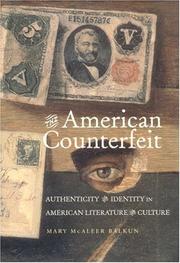
ISBN: 0817314970 0817382577 9780817382575 9780817314972 Year: 2006 Publisher: Tuscaloosa : University of Alabama Press,
Abstract | Keywords | Export | Availability | Bookmark
 Loading...
Loading...Choose an application
- Reference Manager
- EndNote
- RefWorks (Direct export to RefWorks)
Fakery, authenticity, and identity in American literature and culture at the turn of the 20th century Focusing on texts written between 1880 and 1930, Mary McAleer Balkun explores the concept of the "counterfeit," both in terms of material goods and invented identities, and the ways that the acquisition of objects came to define individuals in American culture and literature. Counterfeiting is, in one sense, about the creation of something that appears authentic-an invented self, a museum display, a forged work of art. But the counterfeit can also be a means by which the authentic
American literature --- 20th century --- History and criticism --- 19th century --- Authenticity (Philosophy) in literature --- Identity (Psychology) in literature --- Self in literature --- Passing (Identity) in literature --- Counterfeits and counterfeiting --- Literature --- Twain, Mark --- Larsen, Nella --- Fitzgerald, Francis Scott --- Counterfeits and counterfeiting in literature. --- Authenticity (Philosophy) in literature. --- Impostors and imposture in literature. --- Identity (Psychology) in literature. --- Passing (Identity) in literature. --- Self in literature. --- History and criticism.
Book
ISBN: 1554583500 1282166794 9786613809865 1554583691 9781554583690 9781554583508 9781282166790 6613809861 9781554583324 1554583322 9781554583331 1554583330 Year: 2011 Publisher: Waterloo, Ont. Wilfrid Laurier University Press
Abstract | Keywords | Export | Availability | Bookmark
 Loading...
Loading...Choose an application
- Reference Manager
- EndNote
- RefWorks (Direct export to RefWorks)
Autobiographical impostures, once they come to light, appear to us as outrageous, scandalous. They confuse lived and textual identity (the person in the world and the character in the text) and call into question what we believe, what we doubt, and how we receive information. In the process, they tell us a lot about cultural norms and anxieties. Burdens of Proof: Faith, Doubt, and Identity in Autobiography examines a broad range of impostures in the United States, Canada, and Europe, and asks about each one: Why this particular imposture? Why here and now? Susanna Egan’s historical survey of texts from early Christendom to the nineteenth century provides an understanding of the author in relation to the text and shows how plagiarism and other false claims have not always been regarded as the frauds we consider them today. She then explores the role of the media in the creation of much contemporary imposture, examining in particular the cases of Jumana Hanna, Norma Khouri, and James Frey. The book also addresses ethnic imposture, deliberate fictions, plagiarism, and ghostwriting, all of which raise moral, legal, historical, and cultural issues. Egan concludes the volume with an examination of how historiography and law failed to support the identities of European Jews during World War II, creating sufficient instability in Jewish identity and doubt about Jewish wartime experience that the impostor could step in. This textual erasure of the Jews of Europe and the refashioning of their experiences in fraudulent texts are examples of imposture as an outcrop of extreme identity crisis. The first to examine these issues in North America and Europe, Burdens of Proof will be of interest to scholars of life writing and cultural studies. ‹/p
Autobiography --- Impostors and imposture --- Belief and doubt --- Impostors and imposture in literature --- History & Archaeology --- Biography - General --- Conviction --- Doubt --- Consciousness --- Credulity --- Emotions --- Knowledge, Theory of --- Philosophy --- Psychology --- Religion --- Will --- Agnosticism --- Rationalism --- Skepticism --- Charlatans --- Imposters --- Pretenders --- Crime --- Criminals --- Autobiographies --- Egodocuments --- Memoirs --- Biography as a literary form --- Moral and ethical aspects --- History and criticism --- Technique
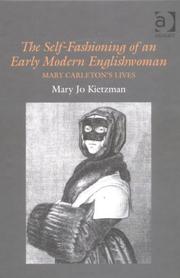
ISBN: 075460859X Year: 2004 Publisher: Aldershot : Ashgate,
Abstract | Keywords | Export | Availability | Bookmark
 Loading...
Loading...Choose an application
- Reference Manager
- EndNote
- RefWorks (Direct export to RefWorks)
English prose literature --- Executions and executioners in literature. --- Executions and executioners --- Identity (Psychology) in literature. --- Impostors and imposture in literature. --- Impostors and imposture --- Narration (Rhetoric) --- Women and literature --- History and criticism. --- History --- History --- History --- History --- Carleton, Mary, --- Carleton, Mary, --- In literature.
Book
ISBN: 067473422X Year: 2014 Publisher: Cambridge, MA : Harvard University Press,
Abstract | Keywords | Export | Availability | Bookmark
 Loading...
Loading...Choose an application
- Reference Manager
- EndNote
- RefWorks (Direct export to RefWorks)
Autobiography --- Engels. --- English fiction --- English prose literature --- Executions and executioners in literature. --- Impostors and imposture in literature. --- Narration (Rhetoric) --- Narration (Rhetoric). --- Recht. --- Romans. --- Women and literature --- Women in literature. --- Carleton, Mary, 1642?-1673. --- Kirkman, Francis, 1632-approximately 1680. Counterfeit lady. --- Women authors. --- History and criticism. --- History
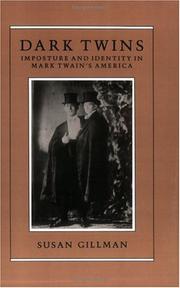
ISBN: 0226293866 Year: 1989 Publisher: Chicago London University of Chicago Press
Abstract | Keywords | Export | Availability | Bookmark
 Loading...
Loading...Choose an application
- Reference Manager
- EndNote
- RefWorks (Direct export to RefWorks)
Doubles dans la littérature --- Doubles in literature --- Dubbelgangers in de literatuur --- Identiteit (Psychologie) in de literatuur --- Identiteit in de literatuur --- Identity (Psychology) in literature --- Identity in literature --- Identité (Psychologie) dans la littérature --- Identité dans la littérature --- Impostors and imposture in literature --- Psychanalyse dans la littérature --- Psychoanalyse in de literatuur --- Psychoanalysis in literature --- Split self in literature --- Twain, Mark --- Criticism and interpretation --- United States --- In literature
Book
ISBN: 9782718607511 2718607513 Year: 2007 Volume: *30 Publisher: Paris: Galilée,
Abstract | Keywords | Export | Availability | Bookmark
 Loading...
Loading...Choose an application
- Reference Manager
- EndNote
- RefWorks (Direct export to RefWorks)
L'imposture est un abus de pouvoir. C'est mentir pour son propre avantage, dissimuler la vérité dans le but de tromper. Certes, mais pour Rousseau, l'imposture, c'est surtout le pouvoir lui-même. Pour lui, prendre le pouvoir, en user ou en abuser, finalement cela revient au même. Dès lors qu'il y a du pouvoir, dès lors donc que quelqu'un se donne les moyens, le droit et l'autorité, de forcer un autre, de l'obliger, de le contraindre, ou simplement de lui faire croire quelque chose, il y a de l'imposture. Autant dire qu'en ce sens, tout est imposture dans le monde des hommes, dans l'histoire, la société, ou la culture. C'est la thèse bien connue de Rousseau: une thèse tragique, qui distingue la nature de la culture par l'événement d'une imposture. Ce n'est ni la science ni la sagesse qui sortirent l'humanité d'un premier état de nature, mais un complot d'imposteurs, de menteurs et de voleurs, qui prétendirent fonder la société civile sur un droit légitime de propriété. Ce rassemblement ou cette meute organise un complot magistral, qui met en scène la parodie de l'histoire en s'appuyant, pour assurer ce maintien frauduleux du pouvoir, sur le double champ du politique et du littéraire: alors que le politique agit au travers du législateur, qui justifie l'autorité et rend légitime un droit de l'inégalité parmi les hommes, le littéraire opère par le lecteur, qui impose les normes du sens, les critères d'interprétation et les conditions générales de lisibilité, pour la compréhension du texte, des lois et des devoirs, dans la Cité. Et s'il n'y a jamais eu de politique sans littérature, ni de littérature sans politique, cela dépend seulement, et justement, de cette économie qui partage, entre nature et culture, une commune et première imposture, par ailleurs immortelle. Mais comment peut-on s'avancer vers un tel horizon d'imposture? Peut-on y résister, y lutter, y engager une écriture, un regard critique, polémique, ou stratégique? C'est toute la question d'une résistance possible qui se pose ici, ou qui s'impose, qui ouvre un nouvel espace de pensée, de responsabilité aussi, devant le destin d'une culture désormais confrontée aux limites de sa propre existence.
Rousseau, Jean-Jacques --- Impostors and imposture in literature --- Rousseau, Jean-Jacques, --- Criticism and interpretation --- Political and social views --- Criticism and interpretation. --- Political and social views. --- Rousseau, Jean Jacques --- Rouseau, Jan Jakub, --- Russo, Zhan Zhak, --- Rousseau, John James, --- Rūssū, Jān Jāk, --- Lu-so, --- Ru-xô, Giăng-Giá̆c, --- Rousseau, Jean Jaques, --- Rousseau, Jean Jeacques, --- Rousseau, J. J. --- Rusō, Jan Jakku, --- Rousseau, Gian Giacomo, --- Ruso, Z'an Z'aḳ, --- Rūcō, --- Citoyen de Genève, --- Citizen of Geneva, --- Roussō, --- Rousseau, --- Rūssō, --- Rousseau, Johann Jacob, --- Руссо, Жан-Жак, --- רוסא, זשאן־זשאק --- רוסא, י׳ן י׳ק, --- רוסו, זאאן זאאק, --- רוסו, ז׳אן־ז׳אק, --- روسو، چان چاك --- روسو، ژان ژاك --- 卢梭, --- Rousseau, Juan Jacobo, --- Rousseau, G. G. --- Ruso, Jan Jak, --- Rūsaw, Zhān Zhāk, --- Rūsū, Zhān Zhāk, --- Rousseau, Jean-Jacques, - 1712-1778 - Criticism and interpretation --- Rousseau, Jean-Jacques, - 1712-1778 - Political and social views --- Rousseau, Jean-Jacques, - 1712-1778
| Listing 1 - 10 of 10 |
Sort by
|

 Search
Search Feedback
Feedback About
About Help
Help News
News